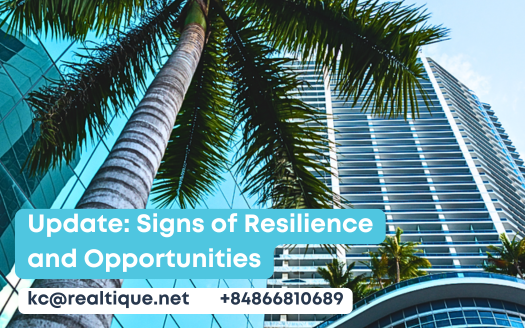Vietnam Real Estate Market Update: Signs of Resilience and Opportunities
Vietnam’s real estate market, despite facing numerous challenges, is showing promising signs of resilience and recovery. While it might still feel like the market is in the deep winter, the early indicators of spring are becoming increasingly evident. This article delves into the current state of the market, the factors influencing its recovery, and why now might be the right time to invest.
Successful Recent Launches
The recent large-scale launches have been remarkably successful, echoing the boom experienced three years ago. Back then, developers strategically launched one or two-bedroom units, leading to rapid sell-outs. This success is being replicated now, signaling a strong recovery in demand.
However, due to the hardship in getting both construction licenses and land fund, new launched projects in Ho Chi Minh City are still limited. Unlike Ho Chi Minh City, Hanoi has seen at least five projects launched from the beginning of the year till now, including:
- Lumi Hanoi: 2,000 apartments
- Lumi Prestige: 600 apartments
- Lumiere Evergreen: 400 apartments
- Matrix Premium: Upcoming
- Lumi Elite: Upcoming
- Imperia Victoria: Upcoming
These projects highlight the growing demand and successful execution of real estate ventures in Hanoi, setting a benchmark for the market.
Political Stability and Local Investment
Interestingly, the current political situation doesn’t seem to have a significant impact on local investors. Despite various geopolitical uncertainties reported in major news outlets, many local investors remain undeterred. They focus on the real opportunities within the market rather than external political distractions.
The Importance of a Structured Investment Process
Navigating the real estate market requires a structured approach. This involves a series of steps, from paying taxes to leasing or selling property. Missing any step in this process can lead to difficulties in managing your money flow, whether you’re bringing it into or out of the market. Therefore, strict adherence to these steps is crucial, especially for international investors transferring funds from overseas accounts.
A professional realtor and a professional banker can significantly ease this process. Researching project details and consulting these experts can help investors get the best out of the market.
Infrastructure Development
Vietnam’s infrastructure is still under development, causing some discomfort at airports, ports, and in traffic. However, improvements are on the horizon. Local investors, who understand the market best, are beginning to see opportunities and feel comfortable and confident in buying again after a period of stagnation.
They are particularly interested in projects along the under-construction metro line in Ho Chi Minh City and better-planned areas in Hanoi like North and South of Tu Liem. These areas promise improved connectivity and infrastructure, making them attractive investment spots.
The Middle-Income Sector
The middle-income sector remains particularly attractive. This is where people aspire to move from living with their parents to owning their property. Various indicators, such as car ownership and the increasing demand for foreign education, suggest a growing middle class with rising purchasing power.
This demand trend ensures the supply of the high-end segment in Hanoi sold out as the price is currently reasonable, around $3,000-$4,000 USD/m².
Role of Foreign Developers
Foreign developers continue to play a significant role in the market. Their presence ensures better rentability and sustainability, providing the necessary support for international investors. They offer paperwork in multiple languages and clear guidelines on investment rights, making it easier for foreign investors to navigate the market. Notable foreign developers include:
- CapitaLand
- Keppel Land
- Kusto Homes
These developers are renowned for their quality projects and international standards, contributing significantly to the market’s attractiveness.
Market Challenges and Opportunities
Despite the challenges, including corruption and infrastructure issues, the potential for growth in Vietnam’s real estate market remains strong. The country’s favorable demographics, GDP growth, and emerging middle class contribute to a positive outlook for investors. For instance, the successful launches of projects like Lumi Hanoi and Lumi Prestige highlight the strong demand and potential for high returns.
Conclusion
While there are hurdles to overcome, Vietnam’s real estate market offers substantial opportunities for both local and international investors. The key is to understand the market dynamics, follow the necessary procedures, and stay informed about the latest developments and trends. With strategic planning and professional guidance, investing in Vietnam’s real estate market can be a highly rewarding endeavor.





